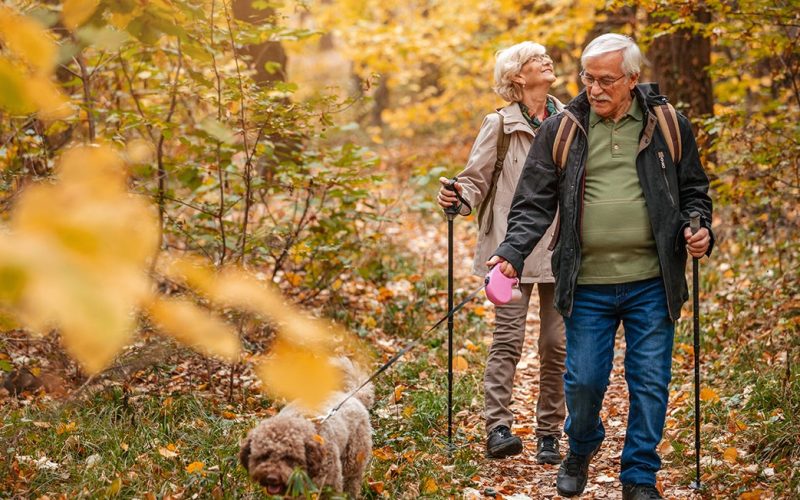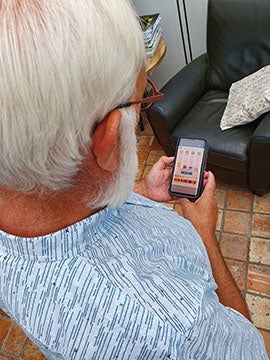People who have had a stroke often experience a TIA, new stroke or myocardial infarction within a year. Funding organization ZonMw is investing 1.1 million euros in a project to improve the daily balance in sitting, exercise and sleep behavior of this patient group. The goal? To reduce the risk of new health problems after a stroke. Physical therapy scientist Martijn Pisters of UMC Utrecht and biomedical scientist Yvonne Hartman of Fontys University of Applied Sciences are leading the project.
Every year, 40,000 people in the Netherlands suffer a stroke. Of that group, about 25 percent suffer a second “cardiovascular event” within a year, such as a TIA, new stroke or heart attack. These new health problems can also cause people to die. They have a huge impact on patients’ lives and those of their families and friends. And they involve high healthcare costs. So if we can succeed in preventing new health problems after stroke, the impact would be huge.
With the ZonMw-funded project, researchers Martijn Pisters, Yvonne Hartman and their colleagues want to reduce the number of new events by improving the lifestyle of stroke patients at high risk. They expect a lot from the project: “In cardiac rehabilitation, you see a 35 percent reduction in the number of new major cardiovascular events and death after myocardial infarction,” Martijn says. “We hope to achieve a similar result with our intervention.”
“In total, we plan to soon collaborate with neurologists, rehabilitation physicians and nurse specialists in 20 hospitals and about 50 to 60 primary care physical therapists.”
The behavioral intervention the researchers are working with within the project is called “RISE. The aim of the intervention is to reduce and break up sitting time, thus enabling people to permanently change their exercise behavior. An important aspect of the intervention is that physical therapists visit people in their homes. They support people to move more, sit less and sleep better after a stroke by offering them personalized advice and guidance. In doing so, people are also helped by a motion sensor specially developed for this intervention that they can put in their pocket and accompanying smartphone app.
The RISE app allows participants to monitor their own sitting and movement patterns.
Another important part of the RISE intervention, is that someone from the immediate environment always receives the intervention along with the patient. “Family and friends are important in helping people with stroke live more active lives and change habits,” Yvonne said. “When they participate, patients often do better and sustain the changes longer.” Due to a previous grant, a study on the effect of the RISE intervention on sitting and exercise behavior in people with stroke has been running since late 2022. Six hospitals and 21 specialized first-line neurorehabilitation physiotherapists in the Eindhoven, Den Bosch and Utrecht region are participating.
If the RISE intervention does indeed help stroke patients stay healthy longer, it could become a standard part of treatment for this patient group.
Because of the new funding from ZonMw, the researchers can scale up the project in the near future. “We want to expand to other regions in the Netherlands,” Martijn says. “In total, we soon want to collaborate with neurologists, rehabilitation physicians and nursing specialists in twenty hospitals and about fifty to sixty primary care physiotherapists. In this way, we hope to follow almost a thousand patients. Those numbers will help us analyze how well the RISE intervention works on preventing new health problems, and whether it is worth the cost.”
If the RISE intervention does indeed help stroke patients stay healthy longer, it could become a standard part of treatment for this patient group.
The RISE research is conducted within the Academic Workplace Physical Therapy, a structural collaboration in research, innovation and education between UMC Utrecht, Fontys University of Applied Sciences, Utrecht University of Applied Sciences and the Leidsche Rijn Julius Health Centers. Other partners in the RISE research are the hospitals involved (St. Antonius Hospital, Diakonessenhuis Utrecht, UMC Utrecht, Jeroen Bosch Hospital, Maxima MC, Catharina Hospital), the Vrije Universiteit Amsterdam, Kennisnetwerk CVA Nederland, patient association hersenletsel.nl, Stroomz, Koninklijk Nederlands Genootschap voor Fysiotherapie, University of Newcastle, Panton, 2M Engineering, Appbakkers and 19 primary care physical therapy practices.

